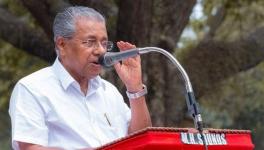Day 1 of Trade Unions-led ‘Historic’ Bharat Bandh ‘Grand Success’
New Delhi: Day one of the 48-hour Bharat Band, called by the Platform of Central Trade Unions and Sectoral Federations and Associations under the slogan “Save People, Save Nation”, against the “anti-worker and anti-farmer policies” of the Narendra Modi government was a “grand success with the massive participation of workers and government employees from all sections of the working class” on Monday.
The platform, comprising 10 Central trade unions—INTUC, AITUC, HMS, CITU, AIUTUC, TUCC, SEWA, AICCTU, LPF and UTUC—has asked workers to protest the reduction in EPFO interest rate, the sudden hikes in petrol, diesel, LPG, kerosene and CNG prices, the four Labour Codes and the National Monetisation Pipeline.
Crores of workers in transport, Railways, electricity, banking and insurance, coal, steel, oil, telecom, postal and income tax— particularly in Kerala, Tripura, Tamil Nadu, Haryana, West Bengal and Assam—participated in the two-day countrywide general strike.
“Industrial areas in most of the states remained closed. The strike was effective in all the major industrial areas in Delhi,” AR Sindhu, national secretary, CITU, said in a press release.
Thanking the striking workers and employees, Tapan Sen, general secretary, CITU, said in a press release: “This historic strike call was given not merely on the immediate demands of the workers but against the anti-national destructive policies of the Central government.”
“The strike was observed in a massive way in the major industrial centres in Maharashtra, Tamil Nadu, West Bengal, Delhi, Telangana, Karnataka and Haryana,” Sen added. “Thousands of people participated in road and rail blockades in numerous places. Factories, shops, offices and commercial establishments wore a deserted look. Despite threats like promulgation of ESMA, the eight-day wage cut notices, etc., the working people responded massively to the call of CTUs.”
Crores of workers in the unorganised sector, including construction, beedi factories, headload and private transport, participated in the demonstrations. “Around 80 lakh workers, including Anganwadi, ASHAs and Mid-Day Meal Scheme, workers played a frontline role in making the strike in the concerned sector almost total,” Sen said.
CITU called “upon the working class to make the second day’s strike even more massive reflecting their anger against the devastating anti-people and anti-national policies of the Modi-led BJP government of corporate-communal nexus at the Centre”.
UP: Privatisation, LIC IPO, NPS Key Issues
In Lucknow, hundreds of industrial workers, bank employees, Life Insurance Employees (LIC), transport department, farmers and postal employees observed the two-day general strike .
Banks in the state capital Lucknow, Ballia, Unnao, Bahraich, Azamgarh, Mathura, Banda, Prayagraj and Varanasi wore a deserted look, and only a few government banks, including State Bank of India (SBI) could be seen open. The employees raised slogans against the Modi government and demanded a stop privatisation of public sector banks.
There was no work in most of the banks of the state, an employees union leader told NewsClick.
Protesting employees in eastern UP demanded a complete ban on contract and outsourcing. Along with this, there was a demand to increase the MGNREGA budget and declare 200 days of work and Rs 500 daily wages.
Postal employees were united in demanding the scrapping of the new pension scheme (NPS) and introduction of the old pension scheme.
Under the banner of All India Postal Employees Association and National Postal Employees Association Action Committee, employees staged a protest across the state, including Moradabad and Prayagraj. They also demanded that all vacant posts in the Department of Posts should be filled.
Five days of work in a week should be implemented for the department staff. The postal department should not be privatised, were their other demands.
The employees' leaders cautioned the government of a mass movement if the demands of postal employees remain unfulfilled.
In Noida, the impact of the strike was visible in the industrial city as hundreds of workers hit the road under the banner of CITU.
CITU District president Gangeshwar Dutt Sharma said trade are demanding employee status to scheme workers; scrapping of four new labour codes, privatisation, retrenchment, among others. They also demanded a halt to demolition of street tracks and setting up of vending zones near the work site under the Street Vendors Act, registration of all the construction workers, social security to rickshaw pullers and tempo drivers.
Abdul Alim Jafri from Lucknow
Delhi: Industrial Areas Deserted
In Delhi, the industrial towns wore a deserted look as “Inquilab Zindabad” slogans resonated and workers took to the streets to protest the “anti-farmer and anti-worker policies of the present regime”.
“The Modi government is pushing for replacing the current labour laws with four Labour Codes,” Harpal Tyagi, leader, CITU, said loudly in the microphone as he led a procession of industrial workers in Badli Industrial Area, which mainly houses units manufacturing utensils, dyes, chemicals, plastic, and electrical and auto spare parts, among others.
“It basically means that the laws, for which workers fought for years, are now being diluted to benefit the employers,” Tyagi said. “The government is pushing for a hire-and-fire policy along with fixed-term employment. They want the workers to be turned into slaves,” he told Newsclick.
Work at manufacturing units in the north of the national capital almost came to a halt. According to the protesting unions, while the “majority of the factory units” were shut down in Wazirpur Industrial Area and Rajdhani Udyog Nagar, “80% of the factories” in Badli Industrial Area remained closed.
“What other choice do we have but to go on strike?” asked Pushpa while rallying along with her striking co-workers in Rajdhani Udyog Nagar. A 40-something contractual worker in a utensil polishing unit, Pushpa lamented how “eight years of service was useless”. “After all these years, I still can’t manage to meet my family’s daily expenses. Prices of all the essential items—cooking oil, gas, vegetables and milk—are rising. How can we manage with such low wages?” she asked.
Notably, trade union leaders alleged that “hardly any worker” in these industrial towns receives minimum wages, as announced by the Delhi government, despite an amendment to the minimum wages law by the AAP government in 2018 to enforce stringent penalties in case of denial of minimum wages to workers.
“I receive not more than Rs 7,000 per month—that too after working for around 12 hours everyday,” rued Nitish Kumar, 22, an ITI graduate. Hailing from Bihar, Kumar said that life is getting more difficult with such low wages.
Ronak Chhabra from Delhi
MP: Mixed Response, Coal, Cement Workers Halt Work
The first day of two-day Bharat Bandh evoked mixed response across Madhya Pradesh.
Coal mine workers of NCL, SECL and WCL spread across Chhindwara, Betul, Shahdol, Umaria, Anuppur and Singrauli districts observed the strike whereas the workers of cement factories of Ultratech, JP, KJS spread in Sidhi, Rewa and Satna districts of Madhya Pradesh boycotted the work affecting over 80% of production, claimed the trade unions.
In over 35 districts, the Medical and Health representatives, Anganwadi, ASHA-USHA, Hammal of the Krishi mandis boycotted today's work to support the strike. In Ashoknagar, Gwalior, Guna and Khandwa, the auto rickshaw unions observed four to five hours of strike affecting the daily commuters. While in other service sectors such as banks, insurance, BSNL, electricity, Income tax and postal office workers also showed their support to the strike and warded off from today's work.
A massive protest was held in Bhopal's Neelam Park and Indore where workers of all the trade unions not only criticised the privatisation of PSUs but also demanded implementation of the old pension scheme .
Sunil Gopal of AITUC said, "The strike is being observed to show the power of the labourers to the central government. They manipulate and divide the workers ahead of elections by bringing religious issues and then decide our destiny."
Pushan Bhattacharya of CITU said it's high time to unite to show our strength as the farmers did in the recently concluded a-year-long protest on the outskirts of Delhi.
Pramod Pradhan of CITU said, "Madhya Pradesh is a BJP-ruled state where the government does not allow strikes. Above all odds, the workers of various sectors not only supported the movement but also hit the streets."
Kashif Kakvi from Bhopal
Kerala: Complete Shutdown
Kerala was completely shut down with a massive number of employees in transport, industry, banking and other government offices participating in the strike. Public buses, including those of state-owned KSRTC, and private buses remained off road. Taxies and autorickshaws were hardly seen as motor workers protested Motor Vehicles (Amendment) Act 2019.
The platform organised massive rallies at major centres in the morning. More than 5,000 workers participated in a public meeting inaugurated by Rajya Sabha member and CITU state general secretary Elamaram Kareem at the Trida Park ground in Thiruvananthapuram. The leaders requested the public to extend solidarity to workers by avoiding travel in private vehicles.
Workers of the electricity board and water authority participated in the join union rally in the state’s capital. With employees of nationalised banks and other financial institutions joining the strike, their operations in the last days of the financial year were severely impacted. School and college teachers and other government employees also boycotted work.
Meanwhile, the Kerala High Court barred the government employees from participating in the strike and directed the state to declare dies non on protest days. A majority of BPCL, workers, especially contractual, joined the protest despite the management’s threats and the court order. The management had issued an order warning the workers of a penal wage cut of 18 days. Very few fuel stations were open as the Petroleum Traders Federation extended solidarity to the trade unions.
Shops and other commercial establishments remained closed. The delivery of milk and newspapers, and hospitals, ambulance services, COID-19 relief work and foreign tourists were exempted from the strike.
Informal workers, agricultural labourers and farmers joined the strike following an appeal by Kerala Karshakasangham, the state unit of AIKS.
Abhivad from Thiruvananthapuram
Tamil Nadu: DMK joins TU Protests
Workers affiliated with trade unions CITU, AITUC, INTUC, TUCC, HMS and others went on strike and blocked roads across the state with several of them being detained.
Despite the state government prohibiting its employees from participating in the general strike, the ruling DMK-affiliated Labour Progressive Federation (LPF) also participated in the protest.
Around 1,10,000 transport workers participated in the protest with a 100% strike observed at the 350 bus depots. Only 30% of the state-run buses operated.
Protesting Anganwadi workers wearing pink and blue uniforms were present in massive numbers at Taluks. Reportedly, 32,000 ICDS centres remained closed.
Around 30,000 loaders, including at railway goods sheds and markets, struck work. Some industries in the suburbs of Chennai reported a 100% strike—Ashok Leyland, Hinduja Foundries, Madras Rubber Factory Tyres, Balmer Lawrie and Tablets India Ltd. Around 30 companies in the automobile belt in Kanchipuram district also participated in the protest—JK Tyres, Apollo Tyres, Yamaha, Cosmos and Hinduja Foundry. In solidarity with the strike, 100 Hyundai workers went on leave and participated in the road blockades.
Workers of sugar mills and cement factories in Perambalur and granite factories in Perambalur district, particularly Nachi Granites, Madhura Rock, Siva Granites, also went on strike.
In Trichy district, all the workers of the Britannia factory and ARK Fuel boycotted work. The port workers in Tuticorin, included permanent and contractual, drivers and others, and 300 employees of Cuddalore boycotted work.
Employees of the Central government-run power companies, including 70% of BHEL workers (1,250 workers) in Ranipet struck work.
Almost 70% of tea, coffee and rubber plantation workers, and Tamil Nadu Salt Corporation workers, and taxi and auto drivers joined the strike.
Sruti MD from Chennai
Assam: Work Affected in Refineries, Tea Industry
Workers in huge numbers participated in the Bharat Bandh with workers in different sectors, including refinery and tea, organising protests, demos, rallies and sit-ins in different parts of the state.
There were reports of detainment of peaceful protesters from several places. In Guwahati, CITU leader Madan Talukdar along with other leaders were detained.
In Biswanath district, north Assam, 200 protesters under the banner of Assam Sangrami Sah Shramik Sangha, a union of the tea workers in the state were detained and taken to Bargang Police outpost.
Similarly, protesting worker in Kalgasia, lower Assam, were detained.
Despite the heavy-handed approach of the administration, protests in Brahmaputra and Barak valleys under CITU, AICCTU, AITUC and other trade unions were held.
Assam Gramin Vikas Bank employees staged protests at several places along with the staff of SBI and other government banks.
Protests were also held at Digboi Refinery (Tinsukia district) of upper Assam and Noonmati Refinery at Guwahati.
The staff of Assam Roofings Ltd. and Export Promotion Industrial Park, Amingaon, near Guwahati, also participated in the countrywide strike.
Besides, employees at LPG plants, in Silchar and Digboi, blocked the entrances.
West Bengal: Industrial Areas Shut Despite TMC Spanner
Despite high-handedness of the administration, the general strike was successful in the industrial areas, including jute and steel mills in Howrah. The police and the RAF allegedly along with TMC members tried to disperse the protesting workers of Ambika Jute Mills but were unsuccessful.
Out of the 52 jute mills situated in North and South 24 Parganas, Howrah and Hooghly, 24 were closed. At other units, 60%-80% of the production was affected.
“Despite the West Bengal government issuing a dies non (no work, no pay) circular to the employees, they enthusiastically participated in the strike,” Subhas Mukherjee, state president, CITU, told Newsclick. “The police used excessive force and arrested picketers in many places.” Only 23% of electricity consumption was recorded in the industrial units of the state as per CESC sources.
In the banking and financial services sectors, the strike was 100% successful. More than 90% of the workers at Central government units boycotted work—100% in the income tax department and 90% in post and telegraph and Geological Survey of India and other departments.
In the Darjeeling district, more than 60% of employees of the tea sector struck work. In the Jalpaiguri district, more than 65% of the tea gardens were closed. The strike was successful 70% in Alipurduar and more than 50% in North Dinajpur.
In the transport sector, only 15%-20% of government workers joined the strike. Private workers joined the strike en masse and all the routes were closed. More than 62% of protesting Ola and Uber drivers didn’t work with about 30 of them being detained.
In the coal sector, 30% of workers joined the strike. The steel industry was affected with more than 60% of workers of Alloy Steels Plant, Durgapur, and IISCO Steel Plant, Burnpur, joining the strike. At the small-scale iron smelting plants, more than 65% of the workers participated in the bandh. Similarly, more than 65% of workers at big cement units struck work.
A full strike was observed by BSNL employees and bidi workers in Murshidabad, Malda and Purulia districts. More than 70% of ICDS workers boycotted work. More than 65% of port workers joined the strike.
The wholesale markets at Posta, Rajakatra, Malapara and KK Thakur Street remained closed. A majority of street hawkers at Sealdah, Khidirpore and Bara Bazaar took part in the strike.
Sandip Chakraborty from Kolkata
Bihar: Private and Public Sector Hit
Thousands of workers, farm labourers, non-gazetted officials, electricity employees, and bank and insurance staff staged protests, took out street marches and held meetings at different places.
Workers and farm labourers blocked roads at several places and disrupted train services for hours to express their protest, affecting normal life mainly in rural and semi-urban areas, considered the stronghold of the Left in the state.
In Patna, hundreds of workers and labourers under the banner of Left parties-led trade unions took to the streets and raised slogans against the Central government’s policies.
Deepak Bhattacharya, state president, CITU, said that both public and private sector workers joined the strike. “Workers, farm labourers and government employees are angry over the rising prices of essential items and the privatisation of public sector units,” he told Newsclick.
Lalan Choudhary, state secretary, Communist Party of India (Marxist), said that the strike got the overwhelming support of workers, farm labourers as well as bank and insurance employees. “Unlike in other states, the focus of the trade unions in the backward state of Bihar, which is devoid of big industries and manufacturing units, was to mobilise workers and labourers mainly from the unorganised sector, such as construction, agriculture and small manufacturing units, as well as thousands of contractual workers in the health and education departments,” he added.
According to AITUC leader Ghazanfar Nawab, “nearly 3,000 branches of banks and hundreds of insurance offices across Bihar joined the strike”, which was peaceful.
Mohd. Imran Khan from Patna.
Punjab/Haryana: SKM Joins Workers
Responding to the call of CTUs, farmer organisations joined the workers’ sin Punjab and Haryana by paralysed banking, insurance, roadways and sanitation services with active support of employees in electricity boards and other government departments. Marches and protests were held in front of factory gates to show united anguish against merger of 44 labour laws into four labour codes and privatisation drive through national monetisation pipeline scheme.
Jai Bhagwan, Secretary, CITU Haryana, said that the strike was completely successful in banking, roadways, insurance, electricity sectors. Even sanitation and scheme workers in rural Haryana participated by ensuring their presence in sit-in protests.
“The people are already feeling the heat of privatisation. Our roadways workers reached the depots at dawn to ensure that no bus would ply. They have returned to mass agitation actions after four years because they are realising that it is a fight for survival. Similarly, the bank employees completely stopped the work in offices, as they are miffed over privatisation drive. Even in tourism department, our workers closed restaurants across the state,” he said.
Sukhbir Singh, President, Construction Workers Federation of India said workers will go back to two decades old norm of Rs 178 as floor rate for wage per day. He said “the Centre must understand that construction workers not only build skyscrapers but bridges and railway tracks. We are building hydel and nuclear plants. The workers in Border Road Organisation build roads in Jammu and Kashmir. When government is saying that it would be privatising its units, the construction workers will get affected.”
Sumit Dalal, Secretary, All India Kisan Sabha, that farmers have joined the action because they are enraged over consistent apathy by the Centre as well as Haryana Government. “Workers are not alone in fight against sale of national assets. Farmers of Haryana are pained the way we have been deprived from due compensation after untimely rains hit Rabi crops in 2021. The farmers of six districts namely Hisar, Fatehabad, Kaithal, Rohtak, Jind and Sirsa lost their crops completely.”
Farmers in Punjab too hit the streets over concerns of less water and electricity for irrigation after centre notified changes in eligibility criteria of members of Bhakra Beas Management Board. Jagmohan Singh, President, Bharatiya Kisan Union Dakaunda told NewsClick that the farmers are worried that more water and electricity would diverted to the central pool putting them at peril.
He said that SKM organised protests across the state with major congregations in Barnala, Mansa, Bathinda and Ludhiana. He said,”We are witnessing one betrayal after another.
On SEB privatisation, Jasvir Singh Dhiman, President, Punjab State Electricity Board Engineers Association, said over the phone that the Centre’s argument does not hold ground that it only changed the technical qualification for full time members of the board and does not intend to alter the structure of the board.
The employees of Punjab state Roadways Transport Corporation who gathered at Patiala bus depot to protest said contractualisation of services did only harm the workers who were made to work on salaries as low as Rs 7,000 per month for years and families sunk deep in debt.
Ravi Kaushal from Delhi
Get the latest reports & analysis with people's perspective on Protests, movements & deep analytical videos, discussions of the current affairs in your Telegram app. Subscribe to NewsClick's Telegram channel & get Real-Time updates on stories, as they get published on our website.
























